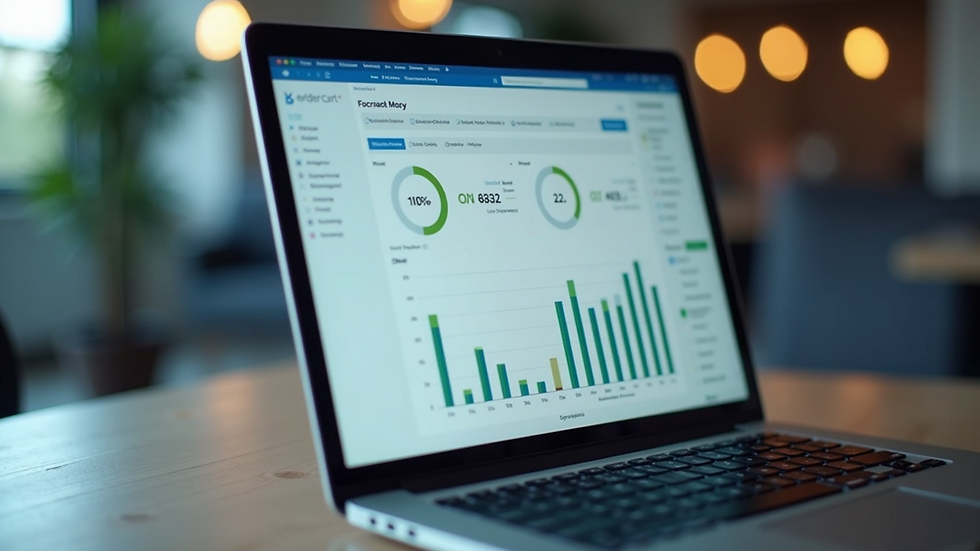Smart Bookkeeping Solutions for Small Business Owners
- Victoria Madison
- Sep 25, 2025
- 3 min read
Managing finances is one of the most critical tasks for any small business owner. Without proper bookkeeping, it’s easy to lose track of expenses, miss tax deadlines, or make poor financial decisions. Fortunately, smart bookkeeping solutions can simplify this process, helping business owners stay organized and focused on growth. This article explores practical strategies and tools that can transform how small businesses handle their accounting needs.
Why Small Business Accounting Help is Essential
Small businesses often operate with limited resources and tight budgets. This makes efficient accounting not just a necessity but a lifeline. Proper bookkeeping provides a clear picture of your financial health, enabling you to:
Track income and expenses accurately
Prepare for tax season without stress
Make informed decisions based on real data
Avoid costly errors and penalties
Improve cash flow management
For example, a local bakery that tracks daily sales and ingredient costs can quickly identify which products are most profitable. This insight allows the owner to adjust pricing or promotions accordingly.

Choosing the Right Tools for Small Business Accounting Help
Technology has revolutionized bookkeeping, making it accessible and affordable for small businesses. Here are some smart tools to consider:
Cloud-Based Accounting Software
Platforms like QuickBooks Online, Xero, and FreshBooks offer user-friendly interfaces and automation features. They allow you to track expenses, send invoices, and generate reports from anywhere.
Mobile Apps
Many accounting software providers have mobile apps that let you snap photos of receipts, log expenses on the go, and monitor cash flow in real time.
Automated Bank Feeds
Linking your bank account to your accounting software automatically imports transactions, reducing manual entry and errors.
Payroll Integration
Some tools integrate payroll processing, ensuring employees are paid accurately and taxes are withheld properly.
When selecting software, consider your business size, industry, and specific needs. Many providers offer free trials, so take advantage of these to find the best fit.

Streamlining Bookkeeping Processes
Efficiency is key to maintaining accurate records without spending excessive time on bookkeeping. Here are actionable tips to streamline your processes:
Set a Regular Schedule
Dedicate time weekly or biweekly to update your books. Consistency prevents backlog and errors.
Organize Receipts and Invoices
Use digital tools to scan and categorize receipts immediately. This reduces clutter and makes retrieval easier.
Separate Business and Personal Finances
Maintain distinct bank accounts and credit cards for business transactions to simplify tracking.
Use Templates and Checklists
Standardize invoicing and expense tracking with templates. Checklists ensure no step is missed during reconciliation.
Outsource When Needed
If bookkeeping becomes overwhelming, consider hiring a professional or using a bookkeeping service. This can save time and provide expert insights.
By implementing these strategies, small business owners can maintain accurate records with minimal stress.
Leveraging Professional Bookkeeping for Small Business Owners
While technology helps, sometimes expert assistance is invaluable. Professional bookkeepers bring experience and knowledge that can:
Ensure compliance with tax laws and regulations
Identify tax deductions and credits you might miss
Provide customized financial reports for better decision-making
Help with budgeting and forecasting
Outsourcing bookkeeping can be cost-effective compared to hiring full-time staff. Many services offer flexible plans tailored to small business needs.
For those interested in exploring professional options, bookkeeping for small business owners offers specialized support designed to simplify your financial management.

Best Practices for Maintaining Financial Health
Beyond bookkeeping, maintaining overall financial health requires ongoing attention. Here are some best practices:
Monitor Cash Flow Regularly
Keep an eye on incoming and outgoing funds to avoid surprises.
Plan for Taxes Early
Set aside money for taxes throughout the year to prevent last-minute scrambles.
Review Financial Reports Monthly
Analyze profit and loss statements, balance sheets, and cash flow reports to understand your business’s performance.
Keep Up with Regulatory Changes
Stay informed about tax laws and accounting standards that affect your business.
Invest in Financial Education
Learning basic accounting principles empowers you to make smarter decisions.
By adopting these habits, small business owners can build a strong financial foundation that supports growth and stability.
Taking the Next Step in Your Bookkeeping Journey
Smart bookkeeping solutions are within reach for every small business owner. Whether you choose to leverage technology, streamline your processes, or seek professional help, the key is to start now. Accurate and efficient bookkeeping not only saves time and money but also provides peace of mind.
Explore your options, experiment with tools, and don’t hesitate to ask for help when needed. Your business’s financial health depends on it.

.png)



Comments